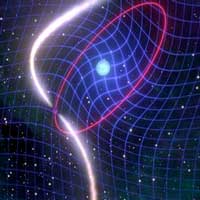 With the help of a radio pulsar, an international team of scientists were able to detect the swirling of the space-time around its fast-rotating white dwarf-companion star, and thus confirm the theory behind the formation of this unique binary star system.
With the help of a radio pulsar, an international team of scientists were able to detect the swirling of the space-time around its fast-rotating white dwarf-companion star, and thus confirm the theory behind the formation of this unique binary star system.
Jan 30th, 2020
Read more
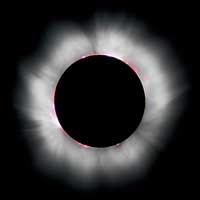 An international team of astronomers has detected large amounts of oxygen in the atmosphere of one of the oldest and most elementally depleted stars known.
An international team of astronomers has detected large amounts of oxygen in the atmosphere of one of the oldest and most elementally depleted stars known.
Jan 25th, 2020
Read more
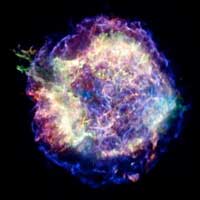 Astrophysicists have, after ten years, found an explanation to the peculiar emission lines seen in one of the brightest supernovae ever observed - SN 2006gy. At the same time they found an explanation for how the supernova arose.
Astrophysicists have, after ten years, found an explanation to the peculiar emission lines seen in one of the brightest supernovae ever observed - SN 2006gy. At the same time they found an explanation for how the supernova arose.
Jan 23rd, 2020
Read more
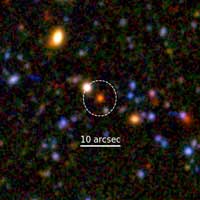 The most distant dying galaxy discovered so far, more massive than our Milky Way -- with more than a trillion stars -- has revealed that the 'cores' of these systems had formed already 1.5 billion years after the Big Bang, about 1 billion years earlier than previous measurements revealed.
The most distant dying galaxy discovered so far, more massive than our Milky Way -- with more than a trillion stars -- has revealed that the 'cores' of these systems had formed already 1.5 billion years after the Big Bang, about 1 billion years earlier than previous measurements revealed.
Jan 17th, 2020
Read more
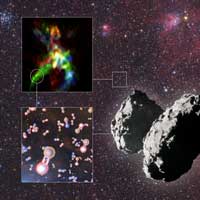 Astronomers have now traced the journey of phosphorus from star-forming regions to comets.
Astronomers have now traced the journey of phosphorus from star-forming regions to comets.
Jan 15th, 2020
Read more
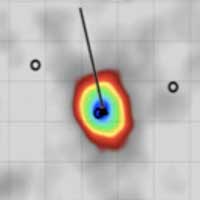 Nine sources of extremely high-energy gamma rays comprise a new catalog compiled by researchers. All produce gamma rays with energies over 56 trillion electron volts (TeV) and three emit gamma rays extending to 100 TeV and beyond, making these the highest-energy sources ever observed in our galaxy.
Nine sources of extremely high-energy gamma rays comprise a new catalog compiled by researchers. All produce gamma rays with energies over 56 trillion electron volts (TeV) and three emit gamma rays extending to 100 TeV and beyond, making these the highest-energy sources ever observed in our galaxy.
Jan 14th, 2020
Read more
 A 'cold Neptune' and two potentially habitable worlds are part of a cache of five newly discovered exoplanets and eight exoplanet candidates found orbiting nearby red dwarf stars.
A 'cold Neptune' and two potentially habitable worlds are part of a cache of five newly discovered exoplanets and eight exoplanet candidates found orbiting nearby red dwarf stars.
Jan 14th, 2020
Read more
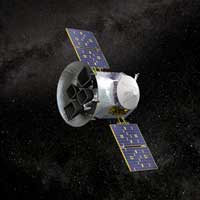 A single bright star in the constellation of Indus, visible from the southern hemisphere, has revealed new insights on an ancient collision that our galaxy the Milky Way underwent with another smaller galaxy called Gaia-Enceladus early in its history.
A single bright star in the constellation of Indus, visible from the southern hemisphere, has revealed new insights on an ancient collision that our galaxy the Milky Way underwent with another smaller galaxy called Gaia-Enceladus early in its history.
Jan 14th, 2020
Read more
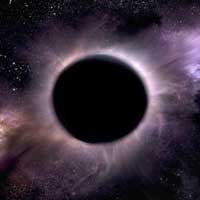 A new study has found that collisions of supermassive black holes may be simultaneously observable in both gravitational waves and X-rays at the beginning of the next decade.
A new study has found that collisions of supermassive black holes may be simultaneously observable in both gravitational waves and X-rays at the beginning of the next decade.
Jan 14th, 2020
Read more
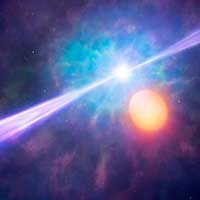 Gamma-ray bursts are the Universe's brightest explosions, caused by massive collapsing stars. Stars need to be in binary systems to create gamma-ray bursts.
Gamma-ray bursts are the Universe's brightest explosions, caused by massive collapsing stars. Stars need to be in binary systems to create gamma-ray bursts.
Jan 13th, 2020
Read more
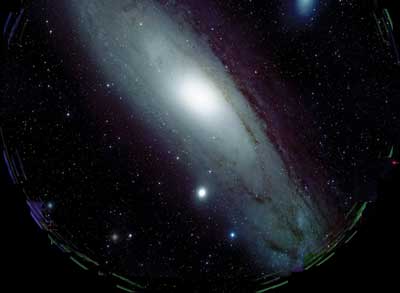 The theory that dark matter could be made of primordial black holes a fraction of a millimetre in size has been ruled out by a team of researchers.
The theory that dark matter could be made of primordial black holes a fraction of a millimetre in size has been ruled out by a team of researchers.
Jan 9th, 2020
Read more
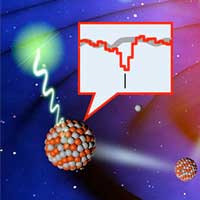 Astronomers have cataloged signs of 9 heavy metals in the infrared light from supergiant and giant stars.
Astronomers have cataloged signs of 9 heavy metals in the infrared light from supergiant and giant stars.
Jan 9th, 2020
Read more
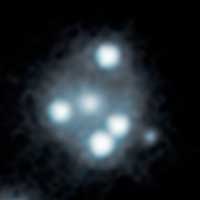 Using NASA's Hubble Space Telescope and a new observing technique, astronomers have found that dark matter forms much smaller clumps than previously known. This result confirms one of the fundamental predictions of the widely accepted 'cold dark matter' theory.
Using NASA's Hubble Space Telescope and a new observing technique, astronomers have found that dark matter forms much smaller clumps than previously known. This result confirms one of the fundamental predictions of the widely accepted 'cold dark matter' theory.
Jan 8th, 2020
Read more
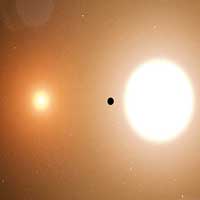 The TOI 1338 system lies 1,300 light-years away in the constellation Pictor. The two stars orbit each other every 15 days. One is about 10% more massive than our Sun, while the other is cooler, dimmer and only one-third the Sun's mass.
The TOI 1338 system lies 1,300 light-years away in the constellation Pictor. The two stars orbit each other every 15 days. One is about 10% more massive than our Sun, while the other is cooler, dimmer and only one-third the Sun's mass.
Jan 7th, 2020
Read more
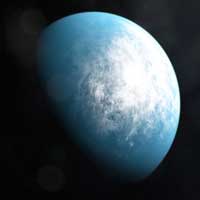 NASA's Transiting Exoplanet Survey Satellite (TESS) has discovered its first Earth-size planet in its star's habitable zone, the range of distances where conditions may be just right to allow the presence of liquid water on the surface.
NASA's Transiting Exoplanet Survey Satellite (TESS) has discovered its first Earth-size planet in its star's habitable zone, the range of distances where conditions may be just right to allow the presence of liquid water on the surface.
Jan 7th, 2020
Read more
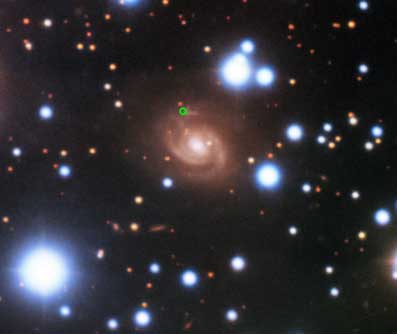 Astronomers have pinpointed the origin of a repeating Fast Radio Burst to a nearby spiral galaxy, challenging theories on the unknown source of these pulses.
Astronomers have pinpointed the origin of a repeating Fast Radio Burst to a nearby spiral galaxy, challenging theories on the unknown source of these pulses.
Jan 6th, 2020
Read more
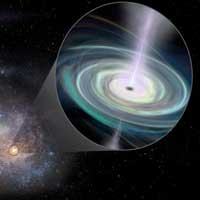 Astronomers seeking to learn about the mechanisms that formed massive black holes in the early history of the Universe have gained important new clues with the discovery of 13 such black holes in dwarf galaxies less than a billion light-years from Earth.
Astronomers seeking to learn about the mechanisms that formed massive black holes in the early history of the Universe have gained important new clues with the discovery of 13 such black holes in dwarf galaxies less than a billion light-years from Earth.
Jan 6th, 2020
Read more
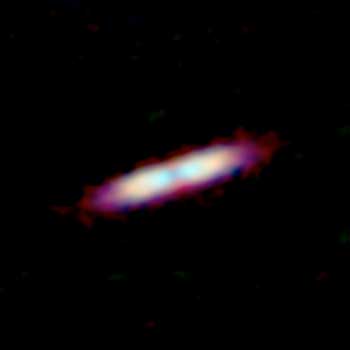 Astronomers found a young star surrounded by an astonishing mass of gas. The star, called 49 Ceti, is 40 million years old and conventional theories of planet formation predict that the gas should have disappeared by that age.
Astronomers found a young star surrounded by an astonishing mass of gas. The star, called 49 Ceti, is 40 million years old and conventional theories of planet formation predict that the gas should have disappeared by that age.
Dec 23rd, 2019
Read more
 With the help of a radio pulsar, an international team of scientists were able to detect the swirling of the space-time around its fast-rotating white dwarf-companion star, and thus confirm the theory behind the formation of this unique binary star system.
With the help of a radio pulsar, an international team of scientists were able to detect the swirling of the space-time around its fast-rotating white dwarf-companion star, and thus confirm the theory behind the formation of this unique binary star system.
 Subscribe to our Space Exploration News feed
Subscribe to our Space Exploration News feed















